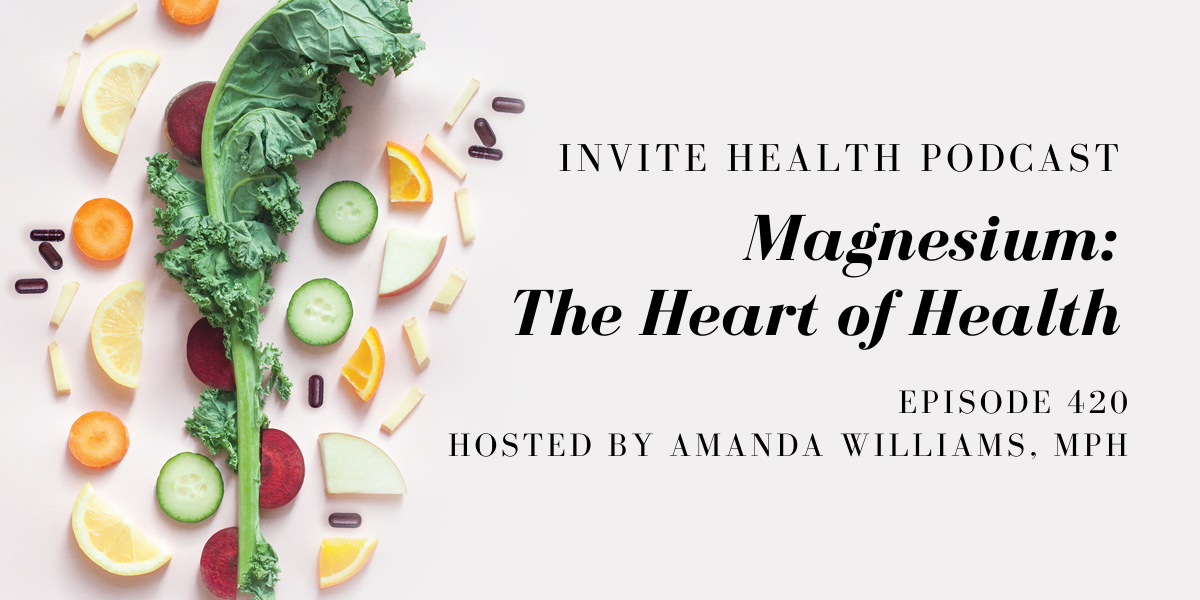Magnesium: The Heart of Health – InVite Health Podcast, Episode 420

magnesium
InViteⓇ Health Podcast, Episode hosted by Amanda Williams, MPH
Subscribe Today!
Did you know that nearly 65% of Americans are considered to have inadequate magnesium intake on a daily basis? This is incredibly problematic when we look at all of the functions of this very important mineral in the human body. If we’re not getting adequate exposure, then it certainly makes sense that we would want to be supplementing with magnesium. Today I want to talk about magnesium when it comes to cardiovascular health and why this is so important.†
Are you lacking magnesium?
When it comes to magnesium deficiencies and insufficiencies, we recognize that this is a major problem. Researchers have found a strong correlation between low magnesium levels and the risk of cardiovascular events.†
DO YOU HAVE A NUTRIENT DEFICIENCY? – INVITE HEALTH PODCAST, EPISODE 201. Listen Now>>
Magnesium is responsible for over 300 different enzymatic processes within the human body. We know that this mineral is playing an integral role in our day-to-day functioning.†
As we get older, we can start to see less and less intake coming from the diet, but also in terms of absorption rate. This is a problem because, as we age, we are at a greater risk for a cardiovascular event.†
Blood pressure and cardiovascular health
Hypertension, or high blood pressure, is the most prevalent risk factor when it comes to heart disease. We recognize that this is a massive problem here in the United States. The American Heart Association estimates that over 40% of Americans will have high blood pressure in the next 10 years. That means that they will be on medication for high blood pressure within the next 10 years. That is very alarming.†
We have to look at how magnesium can play a role into blood pressure levels. When we think about vasodilation and the blood vessels themselves being more relaxed to allow for adequate blood flow, this is very critical to your magnesium status. If we have low magnesium, this is going to create a situation where we’re going to end up with more vasoconstriction. This is because this mineral is a cofactor for hundreds of reactions that occur throughout the body.†
Since we know that low magnesium is an incredibly problematic thing for the body, what can we do? Dietary intake or exposure to magnesium is generally lacking, which is why it is so important to supplement with this mineral. Making sure that we are getting adequate magnesium every single day is critical to our overall wellness.†
At InViteⓇ Health, we offer our Magnesium Glycinate, as well as our Magnesium Citrate. We’re not changing the magnesium, but what we’re doing is we’re changing how it’s brought into the system. When it’s bound to citrate, the absorption rate is just a hair greater than when it’s bound to glycinate. This is very good when we think about intestinal health and for people who have a tendency to experience bouts of constipation. When we think about overall cardiovascular support, I would tend to lean more towards the glycinated form. Since this has a slightly lower absorption rate, the body is able to utilize the magnesium in the bloodstream for full action throughout the day.†
In this episode, Amanda Williams, MPH explains why the mineral magnesium is so important for overall wellness, especially in terms of heart and blood pressure health. She details research on this important nutrient and explains the difference between the glycinate and citrate forms.†
Key Topics:
- How age impacts heart health
- The dangers associated with blood pressure
- What is prostaglandin E1?
Thank you for tuning in to the InViteⓇ Health Podcast. You can find all of our episodes for free wherever you listen to podcasts or by visiting www.invitehealth.com/podcast. Make sure you subscribe and leave us a review! Follow us on Facebook, Twitter and Instagram at InViteⓇ Health today. We’ll see you next time on another episode of the InViteⓇ Health Podcast.


